-
 Bitcoin
Bitcoin $81,899.5591
-5.17% -
 Ethereum
Ethereum $1,783.8667
-6.15% -
 Tether USDt
Tether USDt $0.9995
-0.03% -
 XRP
XRP $2.0489
-4.45% -
 BNB
BNB $587.4139
-2.79% -
 USDC
USDC $1.0001
0.02% -
 Solana
Solana $115.1373
-11.64% -
 Dogecoin
Dogecoin $0.1587
-8.43% -
 Cardano
Cardano $0.6385
-6.91% -
 TRON
TRON $0.2360
-1.08% -
 Toncoin
Toncoin $3.5760
-10.43% -
 UNUS SED LEO
UNUS SED LEO $9.3901
-0.32% -
 Chainlink
Chainlink $12.6219
-9.38% -
 Stellar
Stellar $0.2577
-4.87% -
 Avalanche
Avalanche $18.0492
-6.87% -
 Sui
Sui $2.2219
-9.39% -
 Shiba Inu
Shiba Inu $0.0...01218
-3.70% -
 Hedera
Hedera $0.1604
-7.08% -
 Polkadot
Polkadot $4.0288
-2.51% -
 Litecoin
Litecoin $82.2067
-5.10% -
 MANTRA
MANTRA $6.4186
1.43% -
 Bitcoin Cash
Bitcoin Cash $294.8176
-4.96% -
 Dai
Dai $0.9999
0.02% -
 Bitget Token
Bitget Token $4.4550
-3.01% -
 Ethena USDe
Ethena USDe $0.9995
-0.03% -
 Pi
Pi $0.5875
-13.39% -
 Monero
Monero $209.7409
-4.91% -
 Hyperliquid
Hyperliquid $11.2789
-16.95% -
 Uniswap
Uniswap $5.7386
-7.48% -
 Aptos
Aptos $5.0040
-7.56%
What does blockchain mean and how is it applied in finance?
Blockchain revolutionizes finance by enhancing security, reducing costs, and increasing efficiency through decentralized transactions and smart contracts.
Apr 03, 2025 at 07:42 am
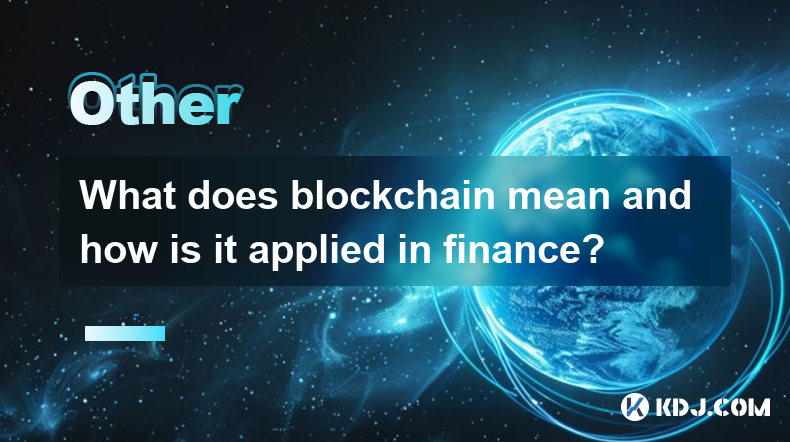
Blockchain is a decentralized and distributed digital ledger used to record transactions across numerous computers. It ensures that each transaction is secure, transparent, and verifiable. The technology behind blockchain was initially developed to serve as the public transaction ledger for the cryptocurrency Bitcoin. However, its potential applications extend far beyond digital currencies. In the realm of finance, blockchain technology is revolutionizing traditional systems by enhancing security, reducing costs, and increasing efficiency.
The Basics of Blockchain Technology
At its core, blockchain is a chain of blocks where each block contains a list of transactions. These blocks are linked using cryptography, making the data stored within them immutable and resistant to modification. Each participant in the network has a copy of the entire blockchain, ensuring that no single entity can control or alter the data unilaterally. The decentralized nature of blockchain eliminates the need for intermediaries, such as banks, in financial transactions.
Applications of Blockchain in Finance
Blockchain technology is transforming the financial industry in several ways. One of the most significant applications is in the realm of payments and remittances. Traditional international money transfers can be slow and costly, but blockchain enables near-instantaneous transactions at a fraction of the cost. Additionally, blockchain is being used for smart contracts, which are self-executing contracts with the terms directly written into code. These contracts automatically enforce and execute agreements, reducing the need for intermediaries and increasing trust and transparency.
Enhancing Security and Reducing Fraud
Blockchain's inherent security features make it an attractive solution for combating fraud in the financial sector. Each transaction on the blockchain is encrypted and linked to the previous transaction, creating an audit trail that is nearly impossible to alter. This level of security is particularly beneficial in preventing identity theft and unauthorized transactions. Financial institutions are leveraging blockchain to secure their systems and protect customer data, thereby enhancing overall trust in the financial ecosystem.
Streamlining Operations and Reducing Costs
The use of blockchain in finance can significantly reduce operational costs by eliminating the need for intermediaries and streamlining processes. For example, trade finance is a complex and paperwork-intensive process that can be simplified using blockchain. By digitizing and automating trade documentation, blockchain can reduce the time and cost associated with these transactions. Similarly, settlement and clearing processes, which can take days in traditional systems, can be completed almost instantly using blockchain technology.
Improving Transparency and Compliance
Blockchain's transparent nature allows all participants to view the entire history of transactions, which can enhance compliance and regulatory reporting. This transparency is particularly useful in the fight against money laundering and other financial crimes. Financial institutions can use blockchain to track the flow of funds in real-time, making it easier to identify and report suspicious activities. Additionally, blockchain can help in maintaining accurate and immutable records, which are crucial for regulatory compliance.
Blockchain and Cryptocurrency
While blockchain technology has numerous applications in finance, its most well-known use is in the realm of cryptocurrencies. Bitcoin, the first and most famous cryptocurrency, uses blockchain to record and verify transactions. Other cryptocurrencies, such as Ethereum, have expanded on this concept by introducing smart contracts and decentralized applications (DApps). These innovations have opened up new possibilities for financial services, including decentralized finance (DeFi), which aims to recreate traditional financial systems without centralized intermediaries.
Challenges and Future Prospects
Despite its potential, blockchain technology faces several challenges in its adoption within the financial sector. These include regulatory uncertainty, scalability issues, and energy consumption concerns, particularly with proof-of-work consensus mechanisms. However, ongoing research and development are addressing these challenges, and many financial institutions are actively exploring blockchain solutions. The future of blockchain in finance looks promising, with potential applications in areas such as central bank digital currencies (CBDCs), tokenization of assets, and cross-border payments.
Real-World Examples of Blockchain in Finance
Several financial institutions have already implemented blockchain solutions to improve their operations. For instance, JPMorgan Chase has developed its own blockchain platform, JPM Coin, to facilitate instantaneous payments between institutional clients. Ripple, another prominent player in the blockchain space, is working with banks to improve cross-border payment systems. These real-world examples demonstrate the practical applications of blockchain in enhancing financial services.
How Blockchain is Changing Financial Inclusion
Blockchain technology also has the potential to improve financial inclusion by providing access to financial services for underserved populations. Decentralized finance (DeFi) platforms, built on blockchain, offer lending, borrowing, and other financial services without the need for traditional banks. This can be particularly beneficial in regions where access to banking services is limited. By leveraging blockchain, these platforms can offer more inclusive and accessible financial solutions, helping to bridge the gap in financial services.
Blockchain and Asset Tokenization
Another emerging application of blockchain in finance is asset tokenization. This involves converting real-world assets, such as real estate or art, into digital tokens on a blockchain. Tokenization can increase liquidity, reduce transaction costs, and enable fractional ownership of assets. Financial institutions are exploring tokenization as a way to modernize and democratize access to investment opportunities. This could revolutionize how assets are bought, sold, and managed, making the financial markets more accessible and efficient.
The Role of Blockchain in Central Bank Digital Currencies
Central banks around the world are exploring the potential of blockchain technology to issue central bank digital currencies (CBDCs). These digital currencies, backed by central banks, could offer a more efficient and secure alternative to traditional fiat currencies. Blockchain's ability to provide a secure and transparent ledger makes it an ideal technology for managing CBDCs. Several countries, including China and Sweden, are already conducting trials and pilots to test the feasibility of CBDCs, indicating a growing interest in blockchain's role in the future of money.
Blockchain and Cross-Border Payments
Cross-border payments are another area where blockchain is making a significant impact. Traditional cross-border transactions can be slow, expensive, and fraught with intermediaries. Blockchain technology can streamline these processes by enabling direct, peer-to-peer transactions across borders. Companies like Ripple are working with banks to implement blockchain solutions that can reduce the time and cost of cross-border payments. This could lead to more efficient and accessible international financial transactions, benefiting businesses and individuals alike.
The Impact of Blockchain on Traditional Banking
Blockchain technology is also challenging traditional banking models. By enabling direct, peer-to-peer transactions and reducing the need for intermediaries, blockchain can disrupt the traditional banking sector. Banks are responding by exploring blockchain solutions to improve their services and stay competitive. For example, Bank of America has filed numerous patents related to blockchain technology, indicating a strong interest in leveraging this technology to enhance its operations. As blockchain continues to evolve, it will likely play an increasingly important role in shaping the future of banking.
Blockchain and Regulatory Compliance
Regulatory compliance is a critical aspect of the financial industry, and blockchain can help in this area as well. The transparent and immutable nature of blockchain can assist financial institutions in maintaining accurate records and complying with regulatory requirements. For instance, blockchain can be used to track and verify the origin of funds, helping to prevent money laundering and other financial crimes. As regulatory frameworks around blockchain continue to develop, financial institutions will need to adapt and leverage this technology to meet compliance standards.
The Future of Blockchain in Finance
The future of blockchain in finance is filled with potential. As the technology continues to mature, it is likely to play an increasingly important role in various financial services. From enhancing security and reducing costs to improving transparency and compliance, blockchain offers numerous benefits that can transform the financial industry. Financial institutions that embrace blockchain technology will be well-positioned to innovate and stay ahead in an increasingly digital world. The ongoing development of blockchain solutions and the growing interest from financial institutions indicate a bright future for this transformative technology.
Common Questions Related to Blockchain and Finance
Q: What is blockchain technology?
A: Blockchain is a decentralized and distributed digital ledger used to record transactions across numerous computers. It ensures that each transaction is secure, transparent, and verifiable. The technology was initially developed for the cryptocurrency Bitcoin but has since found numerous applications in various industries, including finance.
Q: How is blockchain applied in finance?
A: Blockchain is applied in finance in several ways, including payments and remittances, smart contracts, enhancing security and reducing fraud, streamlining operations and reducing costs, improving transparency and compliance, and enabling new financial services such as decentralized finance (DeFi) and asset tokenization.
Q: What are the benefits of using blockchain in finance?
A: The benefits of using blockchain in finance include increased security, reduced costs, improved efficiency, enhanced transparency, and better compliance. Blockchain can streamline processes, reduce the need for intermediaries, and provide a secure and transparent ledger for recording transactions.
Q: What are some challenges facing blockchain adoption in finance?
A: Some challenges facing blockchain adoption in finance include regulatory uncertainty, scalability issues, and energy consumption concerns. However, ongoing research and development are addressing these challenges, and many financial institutions are actively exploring blockchain solutions.
Q: Can blockchain improve financial inclusion?
A: Yes, blockchain can improve financial inclusion by providing access to financial services for underserved populations. Decentralized finance (DeFi) platforms, built on blockchain, offer lending, borrowing, and other financial services without the need for traditional banks, helping to bridge the gap in financial services.
Q: What is asset tokenization, and how does blockchain play a role?
A: Asset tokenization involves converting real-world assets into digital tokens on a blockchain. Blockchain enables this process by providing a secure and transparent platform for managing and trading these tokens. Tokenization can increase liquidity, reduce transaction costs, and enable fractional ownership of assets.
Q: How are central banks using blockchain technology?
A: Central banks are exploring the use of blockchain technology to issue central bank digital currencies (CBDCs). Blockchain's ability to provide a secure and transparent ledger makes it an ideal technology for managing CBDCs. Several countries are conducting trials and pilots to test the feasibility of CBDCs.
Q: How does blockchain impact cross-border payments?
A: Blockchain can streamline cross-border payments by enabling direct, peer-to-peer transactions across borders. This can reduce the time and cost associated with traditional cross-border transactions, making international financial transactions more efficient and accessible.
Q: How is blockchain challenging traditional banking models?
A: Blockchain challenges traditional banking models by enabling direct, peer-to-peer transactions and reducing the need for intermediaries. This can disrupt the traditional banking sector, prompting banks to explore blockchain solutions to improve their services and stay competitive.
Q: How can blockchain help with regulatory compliance in finance?
A: Blockchain can help with regulatory compliance by providing a transparent and immutable ledger for recording transactions. This can assist financial institutions in maintaining accurate records and complying with regulatory requirements, such as tracking and verifying the origin of funds to prevent money laundering and other financial crimes.
Disclaimer:info@kdj.com
The information provided is not trading advice. kdj.com does not assume any responsibility for any investments made based on the information provided in this article. Cryptocurrencies are highly volatile and it is highly recommended that you invest with caution after thorough research!
If you believe that the content used on this website infringes your copyright, please contact us immediately (info@kdj.com) and we will delete it promptly.
- Builder: Stu
- 2025-04-04 03:25:12
- PayPal Adds Solana (SOL) and Chainlink (LINK) to Its Supported Cryptocurrencies
- 2025-04-04 03:25:12
- Recent Price Action Shows Signs of Recovery
- 2025-04-04 03:20:12
- Standard Chartered (AVAX)
- 2025-04-04 03:20:12
- WisdomTree Expands Its Institutional Tokenization Platform to 13 Funds
- 2025-04-04 03:15:12
- PEPE hopped its way to a $3.8M market cap, but its reign as a meme coin darling is fading. Enter InfluencerPepe (INPEPE)
- 2025-04-04 03:15:12
Related knowledge

What are the future development trends of blockchain game development?
Apr 03,2025 at 05:00am
Blockchain technology has revolutionized various industries, and gaming is no exception. As we look to the future, several trends are set to shape the development of blockchain games. These trends not only promise to enhance the gaming experience but also to integrate blockchain technology more seamlessly into the gaming ecosystem. Let's explore these t...

What are the maintenance costs of blockchain system development?
Apr 03,2025 at 06:07pm
The maintenance costs of blockchain system development are multifaceted and depend on various factors. These costs can include technical maintenance, security updates, infrastructure expenses, and personnel costs. Understanding these elements is crucial for anyone planning to develop or maintain a blockchain system. Technical MaintenanceTechnical mainte...
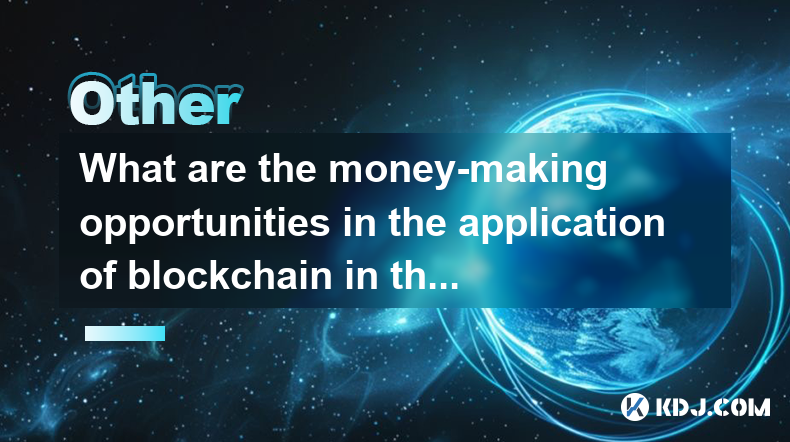
What are the money-making opportunities in the application of blockchain in the medical industry?
Apr 03,2025 at 03:35am
The integration of blockchain technology into the medical industry presents a myriad of money-making opportunities that can revolutionize healthcare systems. Blockchain's inherent characteristics, such as transparency, security, and immutability, make it an ideal solution for various medical applications. By leveraging blockchain, companies can develop ...
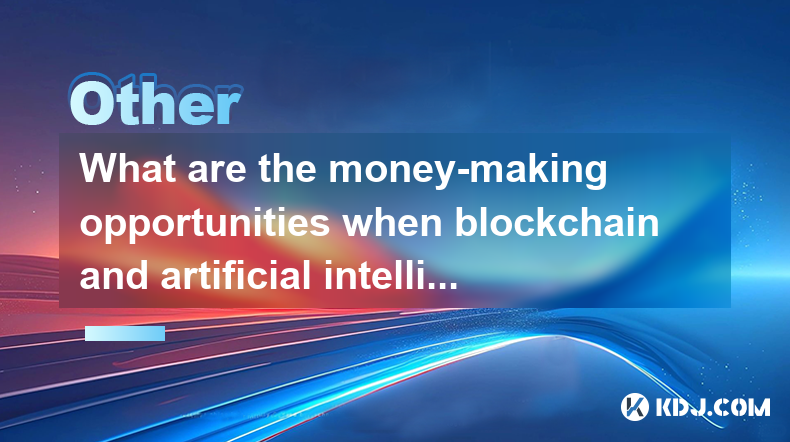
What are the money-making opportunities when blockchain and artificial intelligence are combined?
Apr 04,2025 at 01:28am
The convergence of blockchain and artificial intelligence (AI) presents a myriad of money-making opportunities within the cryptocurrency circle. This fusion leverages the decentralized and secure nature of blockchain with the analytical prowess of AI, creating innovative solutions and platforms that can generate significant revenue. From enhancing tradi...
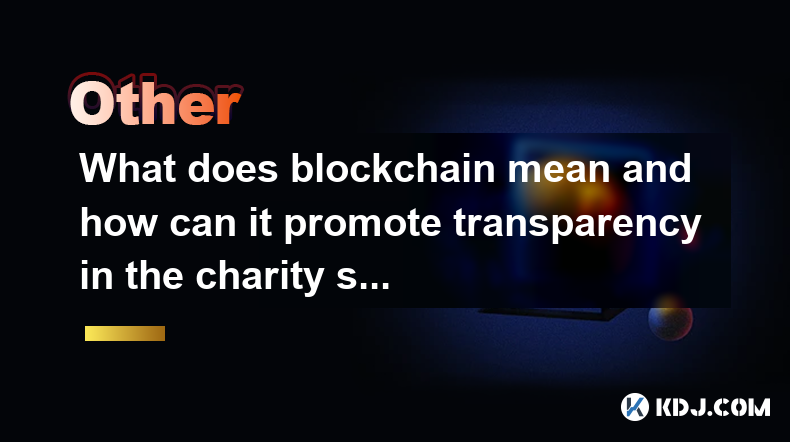
What does blockchain mean and how can it promote transparency in the charity sector?
Apr 03,2025 at 08:29pm
Blockchain technology is a decentralized, distributed ledger that records transactions across numerous computers. This ensures that the data is transparent and nearly impossible to alter retroactively. Essentially, blockchain serves as a digital ledger of all cryptocurrency transactions, enabling secure and direct exchanges without the need for intermed...
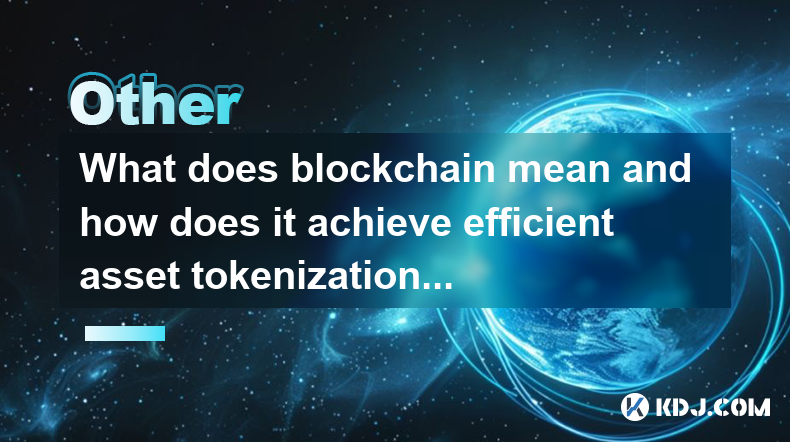
What does blockchain mean and how does it achieve efficient asset tokenization?
Apr 03,2025 at 07:57pm
Blockchain technology is a decentralized, distributed ledger that records transactions across numerous computers. It ensures that each transaction is secure, transparent, and immutable. The concept of blockchain was introduced with the launch of Bitcoin in 2009, but its applications have since expanded far beyond cryptocurrencies. At its core, blockchai...

What are the future development trends of blockchain game development?
Apr 03,2025 at 05:00am
Blockchain technology has revolutionized various industries, and gaming is no exception. As we look to the future, several trends are set to shape the development of blockchain games. These trends not only promise to enhance the gaming experience but also to integrate blockchain technology more seamlessly into the gaming ecosystem. Let's explore these t...

What are the maintenance costs of blockchain system development?
Apr 03,2025 at 06:07pm
The maintenance costs of blockchain system development are multifaceted and depend on various factors. These costs can include technical maintenance, security updates, infrastructure expenses, and personnel costs. Understanding these elements is crucial for anyone planning to develop or maintain a blockchain system. Technical MaintenanceTechnical mainte...

What are the money-making opportunities in the application of blockchain in the medical industry?
Apr 03,2025 at 03:35am
The integration of blockchain technology into the medical industry presents a myriad of money-making opportunities that can revolutionize healthcare systems. Blockchain's inherent characteristics, such as transparency, security, and immutability, make it an ideal solution for various medical applications. By leveraging blockchain, companies can develop ...

What are the money-making opportunities when blockchain and artificial intelligence are combined?
Apr 04,2025 at 01:28am
The convergence of blockchain and artificial intelligence (AI) presents a myriad of money-making opportunities within the cryptocurrency circle. This fusion leverages the decentralized and secure nature of blockchain with the analytical prowess of AI, creating innovative solutions and platforms that can generate significant revenue. From enhancing tradi...

What does blockchain mean and how can it promote transparency in the charity sector?
Apr 03,2025 at 08:29pm
Blockchain technology is a decentralized, distributed ledger that records transactions across numerous computers. This ensures that the data is transparent and nearly impossible to alter retroactively. Essentially, blockchain serves as a digital ledger of all cryptocurrency transactions, enabling secure and direct exchanges without the need for intermed...

What does blockchain mean and how does it achieve efficient asset tokenization?
Apr 03,2025 at 07:57pm
Blockchain technology is a decentralized, distributed ledger that records transactions across numerous computers. It ensures that each transaction is secure, transparent, and immutable. The concept of blockchain was introduced with the launch of Bitcoin in 2009, but its applications have since expanded far beyond cryptocurrencies. At its core, blockchai...
See all articles






















































































